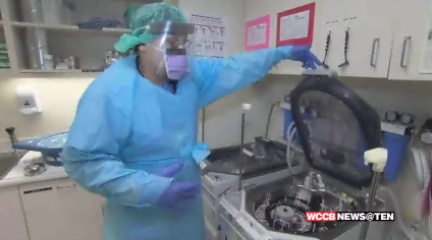[gtxvideo vid=”x1twmVfL” playlist=”” pid=”Bbt3TRDe” thumb=”http://player.gtxcel.com/thumbs/x1twmVfL.jpg” vtitle=”10PM-Superbug 2/22”]
CHARLOTTE, NC — Carolinas Medical Center confirms two patients have died from CRE. One of the patients contracted the Superbug this year, while the other was diagnosed in 2014.
WCCB Charlotte confirmed one of the victims, 88 year old Alda Crump, died Friday. Crump’s daughter, Bennie Petty, says her mother was diagnosed at CMC-Lincoln a few weeks ago, but died at CMC-Mercy.
Petty says hospital officials haven’t said how her mother contracted the Superbug.
Doctors say, unlike the flu, CRE does not have a specific set of symptoms. The symptoms depend on where the bacteria sets up an infection.
“If it’s in the blood stream, you many just have fevers and feel very poorly. If it’s in the lungs you may present with an pneumonia type picture,” said Dr. Katie Passaretti, CMC’s Medical Director of Infection Prevention.
CMC tells WCCB Charlotte that three patients were treated at CMC-Lincoln, and about 15 others contracted the Superbug outside of the hospital system. CMC would not specify were those patients were treated, citing patient confidentiality.
Carolinas Medical Center says this is not an outbreak because numbers are on par with those from previous years. CRE spread in California because doctors used tainted endoscopes during exams. However, CMC says all endoscopes within its system tested negative for the Superbug.
CMC says extra precautions are now being taken and any patients found with the Superbug will be treated in isolation at CMC.
“Anyone who goes in and out of the room has to wear gowns and gloves that are discarded before you go outside of the room. Dedicated nursing staff; not a nurse going from a patient with CRE to a patient without CRE,” said Passaretti.
Passaretti says there are people who are most at risk.
“Patients that are the sickest of the sick. So people that are in the hospital for a long period of time, that are getting advanced care and that are exposed to a lot of antibiotics,” said Passaretti.
The bacteria developed in 2001. It’s so dangerous because it is resistant to most antibiotics.
“Make sure they’re washing their hands. Make sure their doctors are washing their hands. They cannot ask for antibiotics every time they’re feeling crummy,” said Passaretti.





